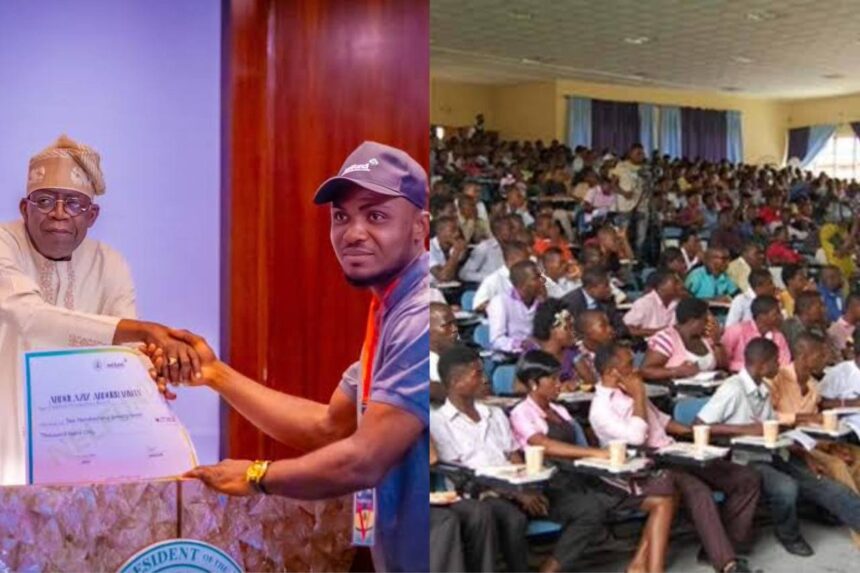The recent launch of the Nigerian Education Loan Fund (NELFUND) by President Bola Tinubu has revealed significant regional differences in loan applications, with northern institutions leading in numbers. This disparity is attributed to proactive measures and better networking within northern educational institutions, as detailed by Dr. Akintunde Sawyerr, Managing Director of NELFUND.
High Northern Participation
The northern regions have shown a marked enthusiasm for the loan program, which Sawyerr credits to the efficient support systems within these institutions.
“Institutions in the North have been very proactive at supporting and helping their students, providing their data to us promptly,”
He stated. This organized approach has led to higher application rates compared to their southern counterparts.
Sawyerr explained that northern institutions have been adept at mobilizing students and facilitating the application process. This proactive stance contrasts with the initial reluctance observed in southern regions. The concerted efforts by northern educational institutions highlight the effectiveness of strong organizational frameworks and community support in driving student engagement with government initiatives.

Southern Skepticism and Growing Awareness
Conversely, the southern regions have exhibited initial skepticism about the loan program’s viability. Sawyerr pointed out skepticism in the South stems from doubts about the program’s authenticity.
“In the southern part of the country, there’s growing awareness and interest. There’s been a lot of skepticism, and I think the most skeptical parts of the country are in the South; they question everything: Is it true? Is it real? Is it a scam?” he explained.
However, this doubt is gradually diminishing as more students witness the actual disbursement of student loans.
“We’re trying to ensure that people know this is not a trick, it’s not a game. Mr. President has backed this with cash, and we’re going to disburse that cash. So, I think we’ll see the skepticism begin to disappear when we start paying out,” Sawyerr reassured.
Efforts are being made to enhance awareness and trust in the southern regions. NELFUND has embarked on a robust awareness campaign to educate students and educational institutions in the South about the benefits and legitimacy of the loan program. These efforts aim to dispel myths and encourage more students to apply, thereby balancing the regional disparities in loan applications.
University Students Leading in Loan Applications
Data from NELFUND indicates that university students are the most active applicants for these loans, followed by students from polytechnics and teacher training colleges.
“In terms of the three levels of institutions, the universities are the ones with the highest demand for the loans, followed by the polytechnics and then the teacher training colleges,” Sawyerr stated. This trend is expected to continue as the program progresses.
The higher demand from university students can be attributed to the larger population and higher tuition fees associated with universities, making the loans more appealing. Additionally, universities often have better infrastructure and resources to facilitate the application process, further driving the high demand. This bias towards university students underscores the need for targeted outreach to polytechnics and teacher training colleges to ensure equitable access to the loan scheme.
READ ALSO: Nigeria Students Loan Bill 2024: A Comprehensive Guide to Application, Requirements and Eligibility
Exclusion of Private Institutions
Students from private institutions are excluded from this loan scheme due to their higher tuition fees. Sawyerr explained that including private institutions would strain the funding capacity of the initiative. “If the government-funded private university students, it would be unable to meet the expectations of the initiative,” he added.
The exclusion of private institutions is a pragmatic decision aimed at maximizing the reach and impact of the loan scheme. By focusing on public institutions, NELFUND ensures that the available funds benefit the largest number of students who are often from less privileged backgrounds. This approach aligns with the broader goal of promoting equitable access to higher education across the country.
Positive Impact and Future Prospects
The loan scheme is anticipated to significantly impact the lives of many Nigerian students, particularly those from underprivileged backgrounds. “The effect of providing this opportunity for the most needy Nigerians cannot be underestimated. These are the most important people in the country that we’re trying to affect,” Sawyerr emphasized.
The positive impact of the loan scheme extends beyond immediate financial relief for students. It is expected to enhance educational outcomes, increase graduation rates, and contribute to the nation’s socio-economic development. By providing financial support, the loan scheme empowers students to focus on their studies, improving their academic performance and future career prospects.
Lucky Imonife, the National President of the National Association of Nigerian Students (NANS), echoed this sentiment, calling the scheme a “new dawn in the education sector.” He highlighted the accessibility of the loans to all students, regardless of their background. “Once you apply, you will get it, irrespective of your status, your age, and your class,” Imonife affirmed.
The Role of NANS and Student Advocacy
NANS has played a crucial role in advocating for the loan scheme and ensuring its accessibility to all students. The association has been instrumental in raising awareness about the loan program and addressing students’ concerns. “Nigerian students are happy that the dream has come true. It was once a dream, but it has become an act, and today, it is the presidential launch and disbursement. We are very proud of this,” Imonife stated.
NANS’ endorsement of the loan scheme is significant as it reflects the collective voice of Nigerian students. The association’s involvement ensures that the loan program remains student-centered and responsive to the needs of its primary beneficiaries. By working closely with NELFUND, NANS helps to ensure the program’s success and sustainability.
Government Support and Policy Implications
The strong backing from President Bola Tinubu underscores the government’s commitment to improving access to higher education. The Student Loans (Access to Higher Education) (Repeal and Re-enactment) Act, 2024, signed into law by President Tinubu, aims to address previous challenges related to governance, management, eligibility criteria, and loan recovery. “Mr President has backed this with cash, and we’re going to disburse that cash,” Sawyerr reiterated.
The enactment of this law represents a significant policy shift towards enhancing educational opportunities for all Nigerian students. By addressing the flaws in the previous Student Loan Act, the new law seeks to create a more robust and effective loan system. This legislative framework provides a solid foundation for the long-term success of the loan scheme.
Conclusion
The NELFUND initiative represents a significant step toward increasing access to higher education in Nigeria. While the North currently leads in application numbers, ongoing efforts to raise awareness and dispel skepticism in the South are expected to balance the participation rates. The program’s success will likely hinge on its continued transparency, efficient management, and positive impact on Nigerian students’ educational prospects.
As the program unfolds, monitoring its implementation and addressing any emerging challenges will be crucial. Continued support from the government, educational institutions, and student organizations will ensure that the loan scheme achieves its intended objectives.








